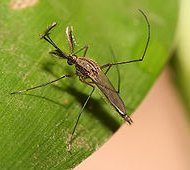
Culex mosquito
Japanese encephalitis (JE) does occur in Thailand. However, for the vast majority of visitors it isn’t a significant risk and medical practitioners will probably say you will not require to be vaccinated against JE for a visit to Thailand. If you are visiting rural border areas of Thailand for any length of time during the rainy season it may be a consideration (see below), but even then medical practitioners may not necessarily advise on vaccination. As always, I stress that I am not a medical expert and you should always consult with your local surgery or medical practitioner when seeking any advice on travel vaccinations for Thailand, or any other country.Japanese encephalitis (JE) is a viral disease which affects the central nervous system.
The JE virus is transmitted to humans from some types of animals (mainly pigs and certain birds such as herons) via the bite of an infected Culex mosquito. The transmission season for JE in Thailand is the rainy season from May to October. The Culex mosquito feeds mainly in daylight hours from dusk to dawn, but visitors to Thailand should take preventative measures (day and night) against being bitten by any type of mosquito.
The risk of JE is minimal in urban areas like Bangkok and in the other main tourist areas such as Chiang Mai, Ko Samui, Krabi, Pattaya and Phuket. Those on holiday, vacation or short-stay visits to Thailand are in the low-risk category and it is highly unlikely your local medical practitioner will advise on vaccination against JE.
You may be considered to be at a higher risk if you are visiting Thailand to do volunteer work in some rural agricultural areas during the rainy season (May-October) and there is a presence of rice fields or marshland where the Culex mosquito could be active. For the same reason, expats living in such rural areas may also be considered to be in a higher risk group. However, that doesn’t always mean that your medical advisor will recommend the JE vaccination.
I can’t make that decision for you and nor can anybody else on travellers forums and websites. You should consult a qualified medical practitioner. Whilst the advice given by other travellers and visitors to Thailand may be well-intentioned, in the case of Japanese encephalitis whether you need to be vaccinated or not will vary from individual to individual and there are also some potential side effects associated with JE vaccinations that need to be taken into consideration. This can only be accurately carried out by a personal consultation between you and a professional medical advisor.
You can, but with the same provisos above; you need to talk through with the doctor or nurse in Thailand any potential side effects you as an individual may have to the vaccine. Whilst many doctors and nurses in Thai hospitals speak excellent English, you also need to take into account potential language difficulties. The vaccine may not be available at all hospitals in Thailand and if you are in a rural area you may need to travel to the nearest large town or city. You will also be required to pay for any vaccine if it is decided that you should be given it and this is something that may not be covered by your travel insurance policy if your insurer says you should have been vaccinated in your home country.
Acknowledgements: National Travel Health Network and Centre (NaTHNac)
